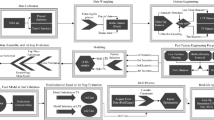Abstract
In this paper we aim to present a simple sports rating system, combine linear algebra rating systems with machine learning methods and show that models’ outputs can be further refined and filtered through application-specific thresholds. First, we propose a sports rating system as well as present some existing linear algebra rating systems and machine learning techniques. Following, we research the possibility of using hybrid models in order to predict the outcome of upcoming games in the English Premier League. We compare the models to random strategies in order to show that they perform better than uninformed methods. In order to further improve their accuracy, matches are filtered out, if they are considered unsafe. This is done by applying thresholds to critical attributes. By optimizing the thresholds for these attributes, models can be either accuracy-oriented, i.e. making the least possible mistakes, or profit-oriented. By optimizing a model for profit, we allow a greater room for error, in the premise that riskier matches yield higher profits. In other words, we change the utility function of the model, making it less risk aversive. This allows more matches to be played, and the average odds played to be higher. In terms of performance, double combination models performed the best and allowed greater flexibility in terms of the desired goal (accuracy, profit). The triple combination model and the plain model performed the worst. This can be attributed to lack of information for the former and the curse of dimensionality for the latter.











Similar content being viewed by others
References
Egba.eu, ’EGBA’, 2015. [Online]. Available: http://www.egba.eu. [Accessed: 16- Jun- 2015]
FIFA.com, ‘The FIFA/Coca-Cola World Ranking - Men’s Ranking Procedure - FIFA.com’, 2015. [Online]. Available: http://www.fifa.com/fifa-world-ranking/procedure/men.html. [Accessed: 16- Jun- 2015]
Colley, W.: Colley’s Bias Free College Football Ranking Method: The Colley Matrix Explained. Princeton University, Princeton (2002)
Govan, A., Langville, A., Meyer, C.: Offense-defense approach to ranking team sports. J. Quant. Anal. Sports 5(1), 1–19 (2009)
Kleinberg, J.: Authoritative sources in a hyperlinked environment. JACM 46(5), 604–632 (1999)
Werbos, P.: Beyond regression: new fools for prediction and analysis in the behavioral sciences. PhD Thesis, Harvard University (1975)
Kohavi, R.: The power of decision tables. Machine Learning: ECML-95, pp. 174-189, (1995)
John, G., Langley, P.: Estimating continuous distributions in Bayesian classifiers. In: 11th conference on Uncertainty in artificial intelligence, pp. 338–345, (1995)
Landwehr, N., Hall, M., Frank, E.: Logistic model trees. Mach. Learn. 59(1–2), 161–205 (2005)
Breiman, L.: Bagging predictors. Mach. Learn. 24(2), 123–140 (1996)
Wolpert, D.: Stacked generalization. Neural Netw. 5(2), 241–259 (1992)
Kyriakides, G., Talattinis, K., Stephanides, G.: Rating systems vs machine learning on the context of sports. In: Proceedings of the 18th Panhellenic Conference on Informatics, Athens. ACM (2014)
Author information
Authors and Affiliations
Corresponding author
Rights and permissions
About this article
Cite this article
Kyriakides, G., Talattinis, K. & Stephanides, G. A Hybrid Approach to Predicting Sports Results and an AccuRATE Rating System. Int. J. Appl. Comput. Math 3, 239–254 (2017). https://doi.org/10.1007/s40819-015-0103-1
Published:
Issue Date:
DOI: https://doi.org/10.1007/s40819-015-0103-1




